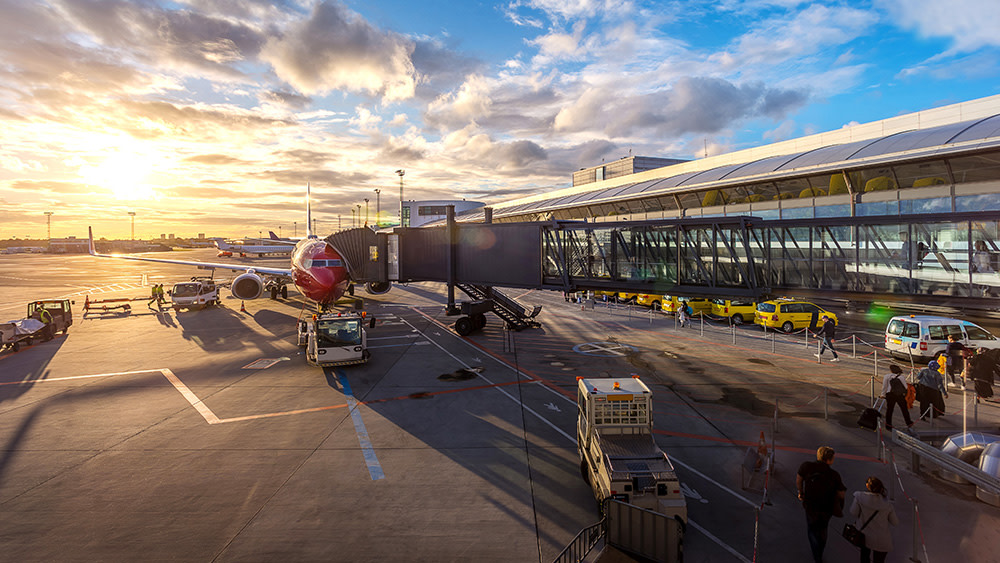If you are aiming for a career as a pilot, flight attendant, or air traffic controller, choosing a degree program that qualifies you for an aviation career is a great way to get started. This profession offers compelling prospects for graduates to grow and develop technical capabilities, travel the world, and more!
Professional opportunities in this industry cover a wide range of roles related to air travel, including aircraft design and maintenance, airline operations, and airport management. With a bachelor’s degree in STEM or a related field, you can explore manufacturing, management, engineering, and more during your studies and discover your preferred career specialization.
Why Work in the Aviation Industry?
This industry is rapidly growing — it supports more than 87 million jobs globally and is projected to grow 23% between 2016-2026 in the US. In addition to increasing opportunities, an aviation career offers the chance to travel internationally and collaborate with colleagues from diverse backgrounds.
Here are several additional key benefits.
Rewarding salaries — These roles have earning potential! Top salaries can result from the high level of theoretical knowledge and skills required to be a good pilot, air traffic controller, airplane operations manager, and more. Some jobs also involve higher risk and variable work hours, which can lead to higher salaries.
Upskilling opportunities — These careers are constantly evolving as technology changes and advances. Employers often promote training programs and certifications so professionals have the most up-to-date skillset.
Travel the world — Permanent or contract-based jobs can require traveling across the world in a single week! As a pilot or flight attendant, you have the chance to travel even when you are off the clock and may be eligible for discounted travel or free tickets.
Meet new people — You'll meet different people from around the world, regardless of your role. If you are interested in expanding your connections across borders and gaining knowledge of different cultures, working in this field allows you to build a vast network of people within the aviation industry.
What Types of Careers Are Available?
Earning a STEM-related degree from a US university covers a variety of fundamental and advanced theoretical and practical skills that you need to perform in entry-level roles. Some careers, like becoming a pilot or aerospace engineer, may also require a master’s degree and extensive training, while administrative or management jobs may only require a bachelor’s degree.
Here are a few careers you can consider:
Flight Attendant
Flight attendants ensure passengers are comfortable on commercial or business aircraft. They are the primary point of contact for passengers for all information regarding the flight, expected weather, travel times, and more. During emergencies, flight attendants follow all protocols and procedures to ensure passenger safety. They are also the first line of support to assist passengers with health/mobility needs during a flight.
The employment rate for flight attendants is projected to grow by 21% from 2021 to 2031. If you plan on becoming a flight attendant, a high school diploma, bachelor’s degree, or General Education Development certificate (GED) may be required, along with relevant work experience in areas such as hospitality or customer service.
Once a candidate passes the interview stage, an intensive training program is offered before getting approval from the Federal Aviation Administration (FAA) to become a flight attendant.
Flight attendants can earn a median salary of $51,645, which can increase depending on individual skills and experience.
Pilot/Co-pilot
Pilots and co-pilots fly and navigate airplanes and helicopters. Usually, an aircraft is flown by two pilots — a primary pilot, also known as the captain, and a co-pilot. The co-pilot is in charge of assisting the primary pilot in flight operations and maintaining navigation, while the primary pilot is the highest-ranking official on an aircraft who operates the plane and monitors the safety of everyone on board the flight.
Pilots must be certified to fly aircraft with passengers, and for pilots to earn an income, there are two types of certifications required: commercial and airline transport. Commercial pilots can be hired and paid for some pilot operations, but are not full captains. Captains require an airline transport pilot certificate. To become a co-pilot, you will need 1,500 hours of flying time before working for any airline. To be promoted to the position of captain, an additional 1,000 hours must be completed as co-pilot first. The educational requirements for both posts are the same, and both roles require a thorough training process with their employer airline.
As of 2022, the average annual pay for an entry-level pilot is $47,120, though this also depends on the type of flights a pilot takes. An experienced certified commercial pilot or co-pilot can make an average salary of up to $99,640 annually, while a certified airline transport pilot or co-pilot can make up to $202,180 annually.
Air Traffic Controller
An air traffic controller coordinates the movements of an aircraft to maintain safe distances between airplanes. They work in control towers, approach control facilities, or route centers. A controller’s function is vital to the smooth movement of air traffic and requires strong scientific and mathematical skills, as well as deep concentration.
To become an air traffic controller, you must hold a bachelor’s or associate’s degree from the Air Traffic Collegiate Training Initiative Program. You may also apply if you have three years of work experience, have completed four years of college, or both. Training is usually done on the job and a candidate is only considered qualified after they receive their certificate from an FAA-approved university.
The average salary for an air traffic controller is $92,946 annually, and can go up to $160,000 a year or more for working 45 hours a week.
Aircraft Maintenance Technician
An Aircraft Maintenance Technician or AMT oversees the routine maintenance, repairs, and inspections of all aircraft under their care. Duties extend to logging notes, keeping records, managing tools and equipment, and more.
AMT opportunities span many sectors, so depending on your interests, you could apply for roles with private tour companies, military organizations, flight schools, freight carriers, and commercial airlines. An aircraft maintenance technician has many chances for professional advancement, and average salaries typically range between $57,602 and $71,000 annually.
To qualify, you must be at least 18 years of age, fluent in English, and have completed 18-30 months of practical experience through a military training course at an FAA-approved AMT school. Several universities and colleges offer diplomas with hands-on training, and these courses provide you with the knowledge and skills to complete FAA certification.
Aviation Manager
This professional plays a critical role in the management of an airport, airline, or other elated enterprises. They specialize in many professions that often involve customer service and flight logistics. Due to the various types of managerial roles in different types of organizations, each manager’s responsibilities will differ. For example, in an airport, the manager’s job is to monitor and ensure compliance with regulatory frameworks and requirements.
Here is a list of possible responsibilities in this role:
Ensuring efficient and safe operation of an airport department
Keeping track of flight schedules and plans
Overseeing inspection schedules
Recruiting and terminating staff
Keeping up to date with the latest industry standards, regulations, procedures, policies, and laws
Working closely with emergency responders
Additionally, you are expected to manage the flow of the department you oversee. This gives you the chance to develop versatile skills such as leadership, communication, problem-solving, and adaptability. This role usually works on a shift basis, especially if it is in an airport. This means your work hours may change depending on the schedule of your department.
The base salary for this role is $21,000, with an average pay of $61,567 annually; it can go up to over $140,000 per year. Because of the diversity of this role, the pay range can differ depending on specific responsibilities and experience required.
Aerospace Engineer
If you are interested in flight innovation and design, an aerospace engineering role can help you explore your creative potential. Your responsibilities can involve developing and testing designs for airplanes, drones, and military missiles. You may also work in areas such as propulsions, aerodynamics, celestial mechanics, and control systems.
An aerospace engineer’s tasks are dynamic and can make for an exciting career. Possibilities include:
Designing aircraft and space crafts
Testing and troubleshooting designs
Overseeing the manufacturing process
Researching a new developing technology
Collaborating on team projects
To become an aerospace engineer, a bachelor’s degree in aerospace engineering or other STEM degree with a concentration in aviation studies may be required.
Many employers also look for graduates with high-level capabilities in Computer-Assisted Design (CAD) and mathematics, along with problem-solving skills, analytical skills, and the ability to collaborate with different teams.
The estimated median pay for an entry-level aerospace engineer is $77,502 per year and can increase to approximately $159,000 annually based on experience and job responsibilities.
How Do I Get a Job in the Aviation Industry?
Depending on which roles interest you, the academic qualifications, training, and skills requirements may differ. Some roles need a bachelor’s and master’s degree related to aviation studies, while others require degrees more aligned toward hospitality and management.
Shorelight universities to consider include:
Auburn University
Ranked #97 in national universities by U.S. News & World Report, Auburn University’s Samuel Ginn College of Engineering offers a top-ranked curriculum in aerospace engineering. Learn from expert faculty in a supportive environment, participate in internship and mentorship programs, and explore your future career.
University of Kansas
The University of Kansas is a top-tier public research university ranked #56 in Top Public Schools by U.S. News & World Report. Engineering students have the opportunity to learn from industry experts and gain hands-on experience by working on real-world projects with leading companies.
University of South Carolina
The University of South Carolina is ranked #115 among national universities by U.S. News & World Report. Recognized for its state-of-the-art campus facilities and immersive student experiences, the College of Engineering and Computing partnership with industry leaders at the IBM Innovation Center offers the ideal learning environment for students to expand their knowledge and skills.
If you need support with choosing a university and college that suits your career development goals, a Shorelight advisor is always ready to assist with exclusive services such as comparing US colleges and providing application assistance to begin your degree. Along academic support, your advisor can provide assistance with language skills, technical training, and professional development resources. Reach out to an advisor to board the flight to your future career!
Reach out to Shorelight for more information on choosing your best-fit school >

